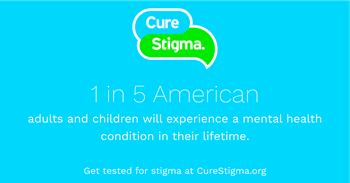Minority Mental Health Awareness Month was established in 2008 to provide support, improve resources, and information to minority communities that lack access to treatment (National Alliance on Mental Illness). Mental health is overlooked by many communities due to the stigma and lack of knowledge about the impact of mental health trauma and diagnosis.

The Project
Over the last couple of weeks, I have been working on co-designing a mental health and self-care strategy program for City Year with my fellow Challenge Detroit participant Emma. Emma and I have been working to understand the needs of City Year AmeriCorps members as well as their staff to address the lack of self-care training and knowledge surrounding mental health both on a personal level and environmental level. The design challenge for us was “how might we create a sustainable mental health component in programming as well as self care strategies for AmeriCorps members within City Year Detroit”. When we designed this program, we were intentional about acknowledging that this program is not only about City Year AmeriCorps members and staff, but also the youth and community they serve. We understood the impact of this program and the potential that it has to trickle down to the classroom interaction that the AmeriCorps members will have. AmeriCorps members are working with youth in the classroom as aids to support and understand classroom dynamics. These members are working 55hrs a week and making little financially to support themselves. These conditions along with personal and professional stressors can leave an individual to feel burnt out or experience compassion fatigue.
The Hope…
Our hopes for this project is to see self care and mental health awareness spread through classroom engagement. It is well documented that human centered action can leave a lasting impact on your development. Mindfulness, self-compassion, and self-kindness are all key components to a positive and balanced response to stress, fear and shame. All are a key to understanding yourself, but also things that everyone has to learn and be reminded of while developing self-care and awareness of mental health. As a limited licensed social worker and advocate for the positive development of youth, families, and communities; I focused on understanding the trauma narratives and responses within communities that impact mental health.
If City Year members are experiencing compassion fatigue and/or feelings of being burnt out; they could potentially be experiencing high levels of stress, frustration, fear, and anxiety that can impact the youth. Under these conditions, AmeriCorps members who lack a self-care regimen and/or understanding of toxic stress can respond in one or two ways in the classroom:
- Giving excessive amounts of energy to provide space for the children, job and community
- Respond in frustration to children youth, co-workers, community
These responses can impact the classroom dynamics in so many ways due to the potential for triggers and lack of mindfulness. Working in a youth engagement and development positions means that you have to provide a level of security for youth as a secure base. Children experience high volumes of trauma and express this in the classroom through various interactions and engagements. Chronic trauma experienced in their daily lives can lead to mental health issues in the community and without support, it can cause continued trauma. Youth need a community of people to be 100%. When you are experiencing high levels of stress and in an environment that is not conducive to self-care, you are not able to provide 100% of yourself because you are not at 100%.
Self-care and acknowledgment of trauma are important elements of community development. Within a classroom environment AmeriCorps members can be used to create a safe and nurturing environment by doing the following:
- Understanding self-care and mental health for themselves (awareness of trauma, stresses, coping skills and activities)
- Applying the activities and knowledge into their own lives (routine practice: meditation, self-regulation, daily nourishment & check ins, etc)
- Be a support for youth and their community by providing further resources for mental illness and self care.
It is time that I get candid about Mental Health! Particularly in the minority community and the fear surrounding mental health. Mental illness does not discriminate, please continue to stay informed! This conversation will continue in a future blog.
